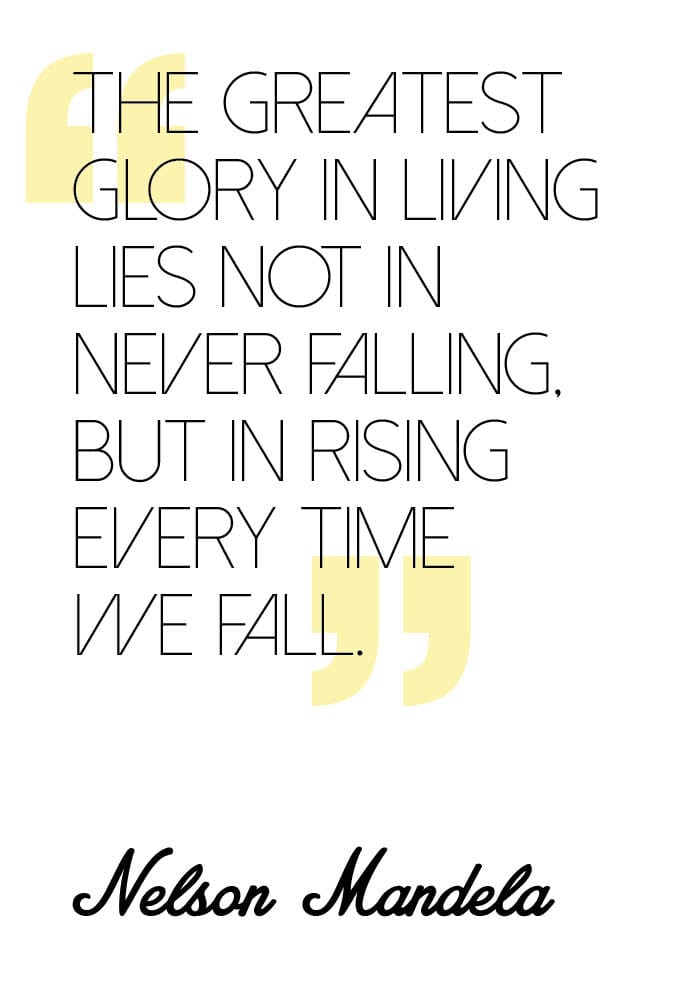At some stage or another we will all face personal crisis, trauma or big challenges. It could be illness, death of a loved one, losing a job or getting divorced. It is part of the ebb and flow of life. How we weather the storm of adversity, how fast we bounce back ultimately comes down to our resilience.
On the day-to-day side of things, how many times have you started out on a new exercise regime and after a while you find it too difficult so you give up. Rather than seeing your setback as a learning opportunity, you feel terrible about it and you get really down on yourself. Resilience can actually help us to push beyond these times of trouble and see the opportunities for self-improvement. I honestly believe that resilience is one of the most important traits that we can have or learn or teach ourselves in life. If we can recover well from stressful situations, we are more in control of our own destiny and more able to live an empowered and energetic life.
Top three ways to boost resilience
How resilient do you think you are? Why not take The Hartford Mile Resilience Quiz and find out if you need a boost. The site also provides some interesting facts and simple tips on how to boost resilience. The top three ways they recommend to hike your bounce-back ability are:
- Exercise and be active. Interestingly the most resilient people list walking as their top physical activity.
- Stay connected. Spending time talking and being with friends and family is key to building resilience.
- Self-improvement. Build inner qualities, e.g. resilient adults have internal locus of control (belief in their ability to control a situation) and high levels of self-efficacy, that is, a believe they can manage in challenging situations.
My personal experience of resilience
I used to be a person who didn’t cope well with challenges or setbacks. Perhaps my childhood was too ‘easy’. I was raised in a normal, loving household and I was lucky enough to face very little trauma. Good marks came easily to me at school and I had never had to try very hard to succeed at anything. In the last ten years however I have been confronted with a number of personal crises and challenges. And I must admit that over time I have adapted and gotten better and better at bouncing back. I believe you can learn to be more resilient and today I’m sharing some of the key things that have helped me.
Proactivity: being a problem solver
Think about ways to fix the problem at hand (if that is possible). Use that knowledge to take positive action, rather than mulling over the problem repeatedly and going in circles. Be proactive about the crisis you are in and if it’s an option, try something different. Draw on your past experiences, what wonderful achievements have you had in the past that could help. Think outside the box.
Support network: calling on friends and family for help
As mentioned above, there’s much research out there showing that positive social relationships are a key component of resilience. In an article about kids and resilience Psychology Today says: All children require positive interpersonal attachments in their lives. Family, extended family, and a host of important adults in kids’ lives (coaches, teachers, clergy) help to promote individual integrity, reliance and trust in others in health. These relationships clearly enhance the capacity to withstand ill fortune. Fascinatingly, it’s a two way street. The mentoring adults benefit as much as the kids from these important alliances.
A few years ago I had two miscarriages in a short period of time and then some nasty kidney stuff as a result of surgery. I leant heavily on my friends and family. And when I say heavily, I mean dead weight HEAVY. I swear to god, they must have gotten so fed up with me talking about my manky uterus and how shit I felt. I don’t know how I would have recovered if it weren’t for all those cups of tea, hugs, bunches of flowers and love that I received in spades during those dark days.
Also having someone you can call on such a wise elder type or even a professional mentor during times of crisis can be helpful. People that you respect will often be able to shed light on how to handle a situation, or offer advice on coping mechanisms you hadn’t thought of, or even share intel on ways to look at the scenario differently.
Acceptance: not fighting the situation
Facing the situation and how you truly feel about it, rather than denying your feelings is so important. Denial can be a protective mechanism but when you try and pretend everything is fine but you are seriously freaking out on the inside, it is not healthy for anyone. Seek professional help if you need it. Don’t use up all your coping energy on fighting an inevitable scenario. Setbacks are a part of life and the most resilient people accept this fact and face challenges as they happen.
Being a survivor and staying positive
The most resilient people believe they are in control of their lives. The best thing you can do is believe that you can cope, believe that you can manage. Put on your survivor hat and know that although you may be facing something traumatic right now, this too shall pass. I believe in the power of bringing positivity to times of crisis. OK it might not exactly be the occasion for a belly laugh (although it probably would help immensely) but at least thinking about good things won’t hurt. I know that I have had a tendency in the past to ‘awfulize’ or to imagine the worst in a situation. Thinking this way is absolutely counter-productive and won’t be helpful. Be mindful, be in the now.
Ultimately, the most resilient people BELIEVE they are in control of their lives. And you know what, we can all do this right now. Look in the mirror. See the awesome person you are. Tell yourself you are in control.
Now go kick that stumbling block’s ass to the curb.
How resilient are you to the pie-in-the-face that life throws at you?












This is brilliant advice. Seriously brilliant. I just took the quiz and I scored 31/40, which I think is a great score and one I achieved through walking through – and surviving and growing from – many a tough time. Love that you wrote this post. May it find its way to someone who needs it right now. x
I scored above my age group for resilience. What let me down was the family side. As we are both expats and I have rocky relationships with some of my family, we’re not always immediately there for each other.
I hope this post helps many people who might just need a little boost
I always surprise myself. I think that I am on the borderline of crashing into the abyss most days (at the moment. Just got a lot on my plate) but keep on pulling through.
I was sacked by email (I know!) last year and was just floored. But had to get up and go to my other job that day. As soon as I had a break I jumped on Facebook and announced I was organising a Melbourne Blogger meetup. I definitely use proactivity as a tool 🙂